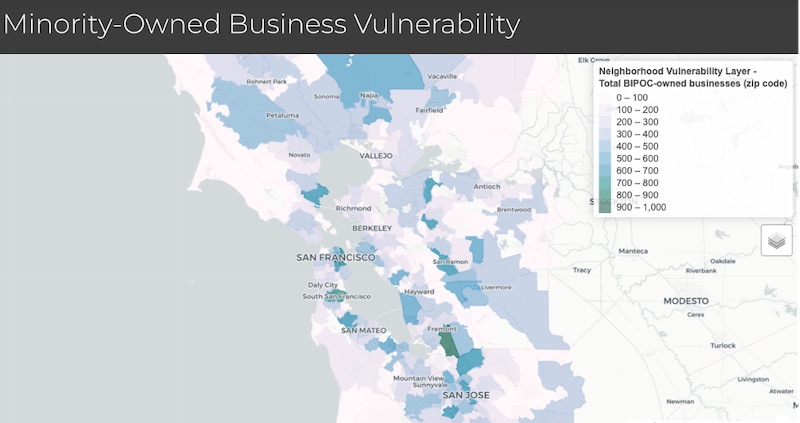
Photo: UN Women/Joe Saad
As California continues to prioritize small business support and recovery, efforts to address the distinct barriers entrepreneurs of color face may be hampered by a lack of quality data on local businesses.
New research from the Urban Displacement Project, a research and action initiative of the University of California Berkeley and the University of Toronto, highlights the difficulty faced in gathering local data on business ownership. The research set out to map the vulnerability of Bay Area businesses owned by people of color in industries most vulnerable to the impacts of COVID-19, including retail, personal services, food services and drinking places, accommodation, child care, arts and entertainment.
Small businesses play a vital role in California’s economy. According to the Public Policy Institute of California, 95% of businesses in the state consist of fewer than 50 employees and those businesses employ one-third of all California workers. The past two years have presented significant headwinds for small business owners to navigate due to the wide-ranging impacts of COVID-19, with disproportionate impacts on small businesses owned by people of color. A nationwide analysis from the Small Business Administration indicated that Black, Asian, and Latino demographic groups experienced the steepest declines in the number of people who were self-employed and working between April 2019 and April 2020.
The Urban Displacement Project researchers noted that Bay Area local governments do not systematically track demographic data related to small business ownership, requiring a more onerous, ad hoc data collection process utilizing both publicly available sources and data provided directly to researchers, including applications to the federal Paycheck Protection Program and member lists of local ethnic chambers.

Source: Urban Displacement Project
The project resulted in an online mapping of vulnerable businesses and a number of findings on specific issues faced by small businesses owned by people of color in the Bay Area, including the fact that businesses in the vulnerable industries noted above are highly concentrated in certain neighborhoods and cities and a plurality are Asian-owned. In the case of the city of Oakland, researchers found higher concentrations of businesses owned by people of color than national level estimates, supporting the idea that national data comes from surveys that are too small to accurately represent what is really happening at the local level.
Greater access to detailed, updated data may help policymakers better target resources and information to business owners, reducing the burden imposed on businesses that may not have the capacity to act on the programs designed to support them. Project researchers are quick to flag, however, the history of and ongoing discrimination faced by business owners particularly when it comes to capital access, and the need to ensure businesses know how their data is being used and who has access to it.
“The overarching goal is that anything that comes out of using this benefits the businesses, in a way that can highlight the trends but also inform policy and support targeting at the local level,” noted co-author Laura Schmahmann, a Ph.D. student in the Department of City and Regional Planning at UC Berkeley. “It may be possible to identify a cluster of businesses in a particular area and determine the gaps that exist that can be filled in terms of information and support.”
CA FWD’s Investing in Small Businesses Owned by People of Color work group set out in 2020 to develop policy recommendations to not only support the state’s diverse entrepreneurs through the challenges of the pandemic, but to address the systemic issues that had long hampered business creation and growth, with a particular focus on capital access barriers. Leaders throughout the state contributed to the group’s framework document that, in addition to sharing policy recommendations, highlighted successful case studies of programs designed to support small business and identified areas where work was still needed.
The 2022 Roadmap to Shared Prosperity details the priorities for all of the work groups and action items for CA FWD throughout the year. Click here to learn more.

